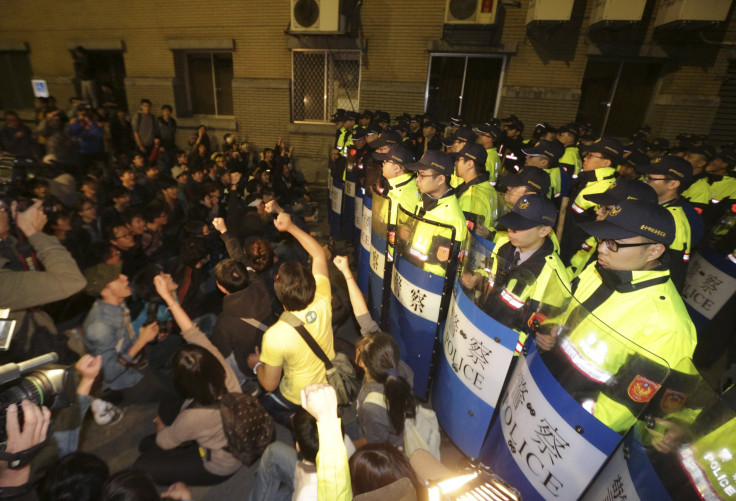Taiwan Student Protests Escalate: Economic Trade Agreement With Beijing Reflects Annexation Fears [PHOTOS]

Last week, Taiwanese university students protesting the government’s Cross-Strait Service Trade Agreement with China took over Taipei’s Executive Yuan, the nation’s parliamentary offices, expressing their outrage over the lack of transparency of the new trade pact with Beijing. Over the weekend, riot police removed dozens of protesters from Taiwan's executive building as rallies continued Monday.
As protests gained momentum, the occupying students demanded an explanation from Taiwanese President Ma Ying-jeou. Around a dozen student protesters stormed the government headquarters shouting for “real democracy.” China Times characterized the incident as “without precedent in the history of Taiwan’s legislature.”
With protests increasing in stridency, and fueled by a passionate, young demographic, economists point toward the annexation of Crimea by Russian military forces as one of the underlying motivating factors behind the Taiwanese protests. Indeed, some Taiwanese fear that the drama played out thousands of miles away in Eastern Europe could be repeated in East Asia as well – with Taiwan playing the role of Crimea and China as Russia.
But protesters are also concerned about the secrecy of the trade pact with Beijing, fearing its terms may include increased control and influence on Taiwan by the mainland. “Most of their fears seem to be less directly related to the economics of the pact,” Christopher Balding, an economics professor at the Peking University HSBC School of Business in Shenzhen, said to the South China Morning Post. “There is this fear in Taiwan that they are being quietly annexed by China.”
But a spokesman for Taiwan’s economic affairs ministry, Du Zijun, defended the terms of the trade agreement, which also marks a thawing of relations between Beijing and Taipei -- mainland China has long adhered to a “one country, two systems” stance (suggesting that Taiwan is merely another region of China), while Taiwan insists they are an independent, sovereign nation. Ma’s opponents in the Taiwanese legislature, the Democratic Progressive Party (DPP), are also against trade deals with Beijing, citing that they would only make Taiwan more dependent on China and ultimately lead to the island forcibly joining the People’s Republic.
Du specifically addressed Taiwanese citizens’ worries that the trade pact would also jeopardize local job markets – possibly by opening the floodgates to an influx of Chinese seeking work on the island – by assuring that only “approved investors” from the mainland would be allowed to enter the Taiwanese markets. Indeed, the trade pact reportedly allows mainland investors to put money into 64 different industries in Taiwan, including sectors like advertising, retail and medical services. The agreement also mandates that only mainland businesses with more than $200,000 in capital would be able to send workers to Taiwan on appropriate visas.
Jiong Gong, an economist at the University of International Business and Economics in Beijing, says that investment trade between Taiwan and China was a long time in the making, noting that Taiwanese investment was allowed in mainland sectors for several years before the most recent agreement. “There has to be reciprocity at some point,” Gong explained.
Still, acts of reciprocity and trade equality are not enough of an explanation for the Taiwanese student resistance and the movement’s supporters who oppose the deal. According to the Taipei Times, the National Tsing Hua University’s Institute of Sociology and National Taipei University’s sociology department, both located in Taiwan’s capital, gave their support to students involved in protest by calling for an unprecedented weeklong cancelation of classes. “The Institute is always there whenever society needs it. … Our students have been fighting on the frontline for justice and for society, and they do not show even an ounce of fear in the face of violence from the state apparatus,” Institute Director Yao Jen-to wrote in an open letter to students. Yao added that classes would resume once the government gave students a “satisfactory response.”
© Copyright IBTimes 2024. All rights reserved.





















